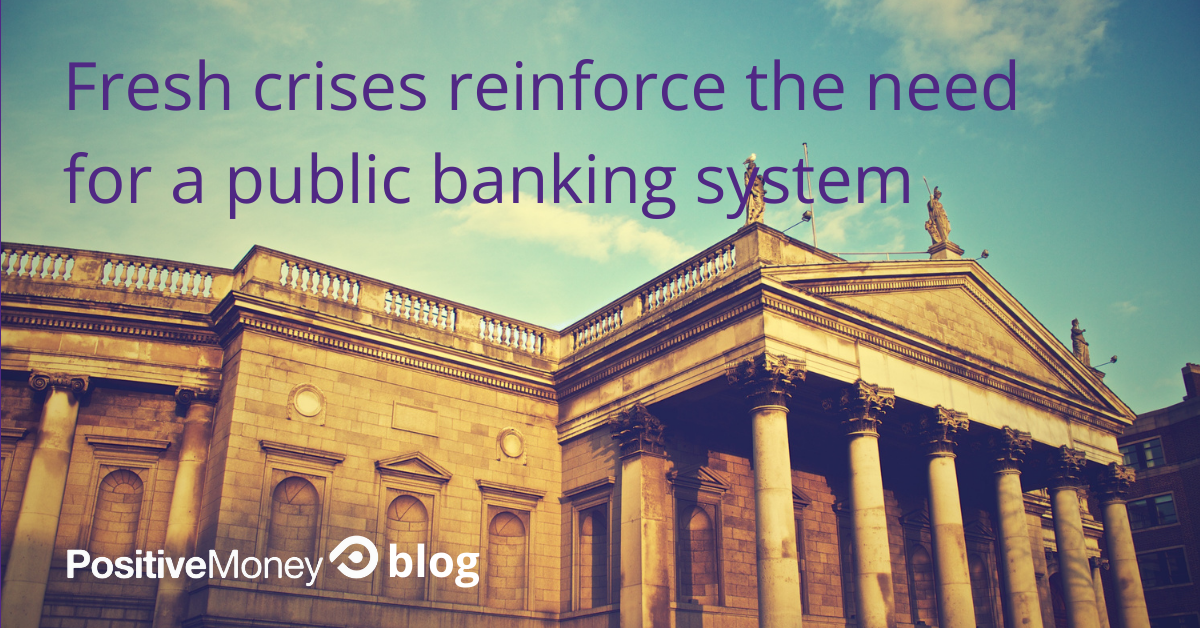
UKGlobal
27 January 2026
The current banking crisis puts the nature of the banking system into sharp relief, and forces us to ask what banking is for and how it can best serve society. It reveals how our money and payments infrastructure are public goods, and should be treated as such through a public banking system.
With everything going on in the world, from the cost of living crisis to increasingly grave climate crisis warnings, why should we care about the latest banking chaos?
The answer lies in the central role banks currently play in our economy. Simply put, unless you are willing to transact only in cash, you are forced to lend your income to a private bank. This is because banks are the only institutions with access to central bank money, the publicly-issued money required for settling payments, in digital form. While we the public are able to access central bank money through cash, if we want to make non-cash payments we have to rely on banks.
The crisis that has emanated from the US banking system reveals the core tension between the vital public good banks provide in processing payments, and how they make their private profits, through riskier lending. Combining these functions makes banks inherently fragile, as they fund longer-term assets like loans with short-term liabilities like deposits, which are accessed on demand for payments.
Banks’ power rests on the fact they are able to create and take the deposits that are relied on for payments. The value of the deposits private banks create remains equal to publicly-issued money such as notes and coins due to significant state backing, namely through deposit insurance. This public backing forms the basis of banks’ entire business models and their exorbitant profits.
If the power of banks comes from their public backing, this raises the question of why we let them get away with using their privileged positions as a basis for making bets where the rewards are privatised and losses socialised, as we saw with Silicon Valley Bank.
The American economist Matthew C. Klein perhaps puts it better than anyone in a recent (sadly paywalled) blog:
“Banks are speculative investment funds grafted on top of critical infrastructure. This structure is designed to extract subsidies from the rest of society by threatening civilians with crises if the banks’ bets are ever allowed to fail. The U.S. government’s response to the collapses of Silicon Valley Bank and Signature Bank—effectively removing the $250,000 cap on deposit insurance while letting lenders borrow relatively cheaply against fictitious asset values—is a reminder that those threats usually work.”
Money and payments are one of a number of key public goods that the very functioning of our society is dependent on, alongside utilities such as water, electricity and telecoms. If a bank fails, businesses will be unable to pay workers, and households would be unable to pay their bills or buy essentials like food. And if the bank failure is big enough it could drag the entire economy down with it, as we saw in 2008. But no other utility industry, even those that have been privatised, has been given such free reign to enrich themselves through risk-taking and cause as much damage as banks have.
If we are to treat money as the public good it is, we will need a systemic overhaul. This can and should be done in a way that actually simplifies the system, rather than continuing to paper over the cracks with an increasingly complex tower of regulation very few can understand, as has been the response after every recent crisis.
What will it take to keep our money safe from another #BankingCrisis? 📈🏦
It's time for a financial system that puts people – not greedy banks – first.
Watch + RT to help spread the word! pic.twitter.com/Jgeg8Eztuk
— Positive Money (@PositiveMoneyUK) March 24, 2023
The necessary reform can be articulated through a vision for a ‘public banking system’. This could be comprised of two complementary parts. First, a genuine public banking option that allows people to store money and make payments without being exposed to the risk taking of profit-maximising private banks. Secondly, regulation of banks that better reflects the fact they are utility companies for which the provision of key public goods are franchised out to by the state. This must also be accompanied by stronger regulation of so-called ‘shadow banks’ — non-bank financial institutions, such as insurers, pension funds and other asset managers, which are able to undertake the functions of banks without the corresponding regulation.
An opportunity for a public banking option currently exists through the development of a digital pound, which Positive Money has long advocated for. The UK government is currently consulting on its introduction, which could give the public the same access to the risk-free public money used for settling payments as enjoyed by banks, meaning we would no longer need to rely on them as middlemen. Safe digital pound retail banking services could also be provided by a trusted public institution like the Post Office, which has the infrastructure in place through the range of crucial services it already provides access to in the UK, as well as a greater variety of new ‘stakeholder’ banks.
Critics, such as members of the House of Lords who happen to have links to incumbent financial firms, have previously written off a digital pound as ‘a solution looking for a problem‘. Recent events have helped illustrate one of the big problems it is a solution for.
Regardless of whether we have a public banking option, we also need new models of regulation for private banks, reflecting the fact that their ability to make loans relies on public backing. Finance law professor Rohan Grey has put forward a compelling vision for such a model, which can be summarised as “any asset a bank is authorised to make should be acceptable collateral at acquisition price at the discount window”. In other words, banks would only be able to use the public’s money to fund assets that the public ourselves would be prepared to accept via our central bank’s balance sheet, in effect giving the public much greater control over banks’ credit allocation in return for our backing.
Similar arguments have been echoed by other leading thinkers such as Saule Omorova and Nathan Tankus, as well as even former Bank of England governor Mervyn King. Positive Money has also put forward similar proposals in the past as part of a sovereign money system.
As Grey, Omorava, Tankus et al also recognise, it is equally vital to keep a lid on shadow banks. While central bankers will always stress that the banking system is better capitalised than in 2008 and safe enough to withstand risks, they may be less able to talk so confidently about shadow banks, as former Bank of England deputy governor Paul Tucker has raised the alarm on. We saw a hint of the problem in the Autumn when UK pension funds almost collapsed, revealing that they had been playing with significant leverage while regulators weren’t paying sufficient attention. As well as considering stronger banking regulation, it is vital that regulators don’t simply end up shifting risk to other parts of the financial system, which appears to be the likely result of current efforts to deregulate insurers.
Since our founding in 2010, Positive Money has been fighting for a system that separates the public good of the payments system from banks’ pursuit of private profit. The current crisis shows this is needed more than ever, and must be seized as an opportunity for us to get there.
Sign-up to our mailing list for updates about our work fighting for a money and banking system that enables a fair, sustainable and democratic economy.
